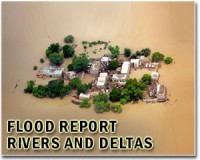| . |  |
. |
Maputo (AFP) March 7, 2011 Twenty-four people were killed during Mozambique's 2009-2010 flood season, an official said Monday, as the government downscaled the red alert in the last remaining flood-prone areas. "The total deaths during the emergency period were 24," Dulce Chilundo, director of the National Emergency Operation Centre (CENOE), told AFP. Lightning killed 18 in the central province of Manica, while six died from flooding in the southern district of Limpopo, Chilundo said. Around 22,000 people left their homes to escape flood waters this year. In the Limpopo river basin in the south, 19,000 left voluntarily, while authorities evacuated a further 260 by force. In the Zambezi river basin in the north, around 2,000 people moved to higher ground of their own accord while a further 100 had to be removed. Disaster management services will remain on standby until the end of the rainy season in March, said Chilundo. Authorities had feared the worst floods since 2000, when more than 800 people died, but the impact was less than expected. The number of forced removals was also far lower than during the 2007-2008 flooding season, when authorities had to evacuate 102,000. This indicated people were starting to heed authorities' early warning messages, said Chilundo.
earlier related report Build something, they say, to stop the water that flowed in from surrounding waterways several months ago, causing part of the worst flooding in West Africa last year and leading families to pay fishermen to take them away in dugouts. "The politicians have to do something so that the water doesn't just come in like that," said Agnes Doha, a 50-year-old fish seller with six children, whose home of aluminum sheets and concrete blocks was overcome by the floods. Doha said she was supporting President Boni Yayi in the March 13 election, which has been postponed twice because of delays in organising it. But she and others in the Vossa district of Cotonou said it mattered less to them who won than what the victor's government does for their area afterward. Residents fled Vossa last year as floods during the rainy season slowly rose, eventually reaching chest-high or more in the low-lying neighbourhood. Several months on, the district again teems with activity, with children searching for crickets to use as fishing bait and residents setting up market stalls lit by the flames of small lamps in front of huts that they repaired. A pig roamed across the muddy ground on Saturday evening and skinny chickens pecked their way down alleys. But while Benin's presidential election is due on March 13, there has not been much talk of the floods that the United Nations says left more than 105,000 people homeless and affected some 680,000. According to the UN, the country of 9.2 million people was the worst hit by devastating West African flooding during the 2010 rainy season. At least 46 people were reported dead. Vossa residents told horror stories of having to scrounge up enough money to pay fishermen to leave in their wooden dugouts when the water rose too high, packing whatever they could in carry bags. One man said he knew of children who had drowned, and spoke of losing clothes, documents and whatever else he and his family could not take with them. Jacob Tokpon, a 45-year-old fishermen whose bamboo hut took on water even though it is already built on stilts, said the government should construct a barrier to keep such flooding from happening again. "We don't want water coming in like that," the father of eight children said in the local Fon language, a crowd of residents that had gathered around him nodding in agreement. "We want them to block the water, build something." He said his family lived at a school for three or four months as they waited for their neighbourhood to dry out. Relief items such as rice and mosquito nets were provided at the time, said Tokpon, with the UN having appealed for emergency funding. Victor Kouliho, 50, said the flooding was the worst he had seen in four decades and ruined everything inside his bamboo home, but he was able to move back in it when it dried. "We need pipes to drain off the water," he said. Kouliho disappeared for a minute so he could fetch something from his house and returned with a picture of himself. It was taken as the water was rising and he was preparing to flee, holding a wicker basket full of prawns he intended to sell and another bag of personal belongings with a look on his face that seemed both shocked and amused.
Share This Article With Planet Earth
Related Links Bringing Order To A World Of Disasters When the Earth Quakes A world of storm and tempest
 Flood-hit area of Benin has message for future president
Flood-hit area of Benin has message for future presidentCotonou (AFP) March 6, 2011 Water lines still stain the sides of bamboo huts in a deeply poor district of Benin's main city, but life has returned, and residents have a message for the candidates in upcoming presidential elections. Build something, they say, to stop the water that flowed in from surrounding waterways several months ago, causing part of the worst flooding in West Africa last year and leading families to ... read more |
|
| The content herein, unless otherwise known to be public domain, are Copyright 1995-2010 - SpaceDaily. AFP and UPI Wire Stories are copyright Agence France-Presse and United Press International. ESA Portal Reports are copyright European Space Agency. All NASA sourced material is public domain. Additional copyrights may apply in whole or part to other bona fide parties. Advertising does not imply endorsement,agreement or approval of any opinions, statements or information provided by SpaceDaily on any Web page published or hosted by SpaceDaily. Privacy Statement |